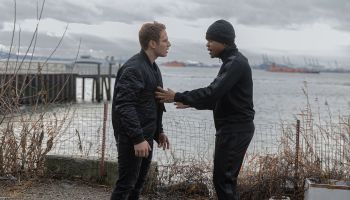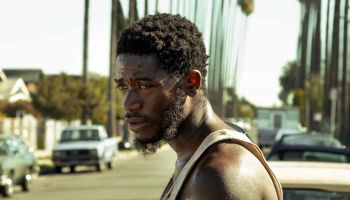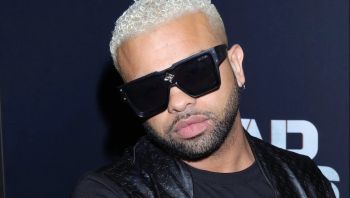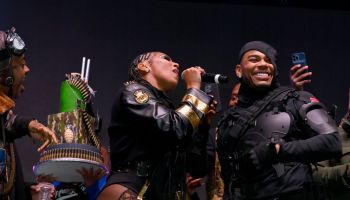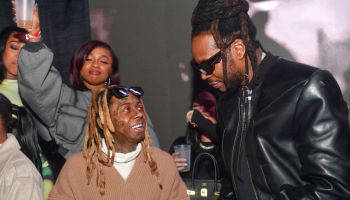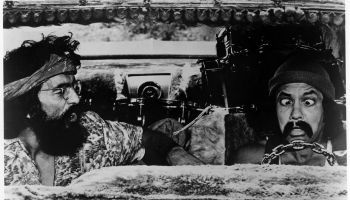A very focused and extremely eloquent Jesse Williams sat down with GlobalGrind at the Sundance Film festival this week to talk about his newest passion: the launching of his spanking new production company, farWord Inc.
HOT TO DEF: AnnaLynne McCord Stunning In Red At 2012 Sundance Film Festival
Jesse plans to focus on purposeful film, literary and academic pursuits and the debut of its first project Question Bridge: Black Males at the 2012 Sundance Film Festival.
PHOTOS: Celebrities Out & About At Sundance Day 1
The 30-year-old actor has been on the scene for a while, leaving behind a career in teaching and taking on roles in shows like Grey’s Anatomy and Law And Order, but now he’s taking matters into his own hands.
Check out our chat with the breathtaking chap as he fills us in on his new venture below.
What made you go with the name farWord for your new production company?
Jesse Williams: I kind of created it when I was at Temple University. It really kind of happened to me. I wanted to be productive and constantly push myself forward. The word ‘Word,’ the one I give you and the written word, is really what’s going to take you far. When I think of farWord, I think of the distance that you are hoping to go, the direction that you are hoping to go and the means by which you plan to carry your plan forward. Storytelling is based on the word, being an honorable person of integrity is based on your word.
Tell me about the importance of education in your life.
Since I was a public school teacher, I have a big background in education and it means a lot to me. My father is a teacher. My mother is a teacher. And they came to teaching after I was in high school. My mother was an artist and ceramicist. My father was a factory worker who put himself through Harvard while I was in high school.
You told me you had wanted to be a football player or a civil rights attorney, so how did this entertainment career come about…was it totally accidental?
In a way, yes. I started as a model. Went to NYC. Worked in a law firm for a year after being a teacher. Started going to little auditions and developing a little career. My parents always encouraged me and were used to me trying out wacky stuff. I’m very grateful and fully aware that 90 percent of actors are not working. Going from public school teacher to a show like Grey’s Anatomy, I love what I do…I’m very, very happy, but I missed the work that I was doing in communities in need. This project is a perfect one to launch my production company using media for social good and using any attention that I can get, to forward it to a cause that is attention worthy…and has a real future.
What about Tyler Perry and the empire he has built on stereotypes?
I’d rather not go there. You can say what you want about him…I think that really the issue that kind of clouds the financial support for Tyler Perry has much less to do with his work and more about the lack of diversity in black material. I don’t personally love his work, but I don’t think we should stop making it. I think we should be making more work.
He is successful because he speaks to a community that is underrepresented and that enjoys his work. His work clearly has some merit because it’s generating revenue and putting butts in seats. It’s hard to put butts in seats. He’s a very accomplished individual and a very business savvy person.
Your mother is white and you father is black. As a person of mixed race, do you feel represented in media today?
I’ve had a million conversations with my friends of color… No, we don’t feel represented in media. We feel that there is a one-way street of blackness in media. We are not homogenous…we are not all the same. One of the things that excite me most about this project is putting young men in a place where they can have a dialogue with their elders and have a resource, and some mentorship and a correspondence. Men are not used to talking, or admitting a mistake, or asking for directions, or taking care of a sports injury. We are stubborn beings. So getting young men, like the ones that I taught and like the one that I was, to sit down and ask a question, because you are committing to sticking around for an answer. You become a participant in your future.
You told me you are a political junkie. What do you think of President Obama after 3 years?
I think that the conversation from his critics was framed in such a way that has a convenient forgetfulness of the situation that he was handed and, sure the bar was raised really high, but that’s what campaigns are for. This was not the first and not the last campaign that made a lot of promises, there is nothing unique about the Obama Administration, this is just the first time there is a black guy doing it.
Most of the critics of that administration were silent during the eight years of having the country run by a man who could not run a gas station. That man could not run an Amoco but all of a sudden you are up in arms? That is not a serious conversation.
What’s in the future for Jesse Williams?
Staying true to our goals, Question Bridge as a company and as a project is not singularly about black males. One of the things I’m so excited about Question Bridge is that my vision goes far beyond black males. We are going to have Question Bridge: Immigrants, Question Bridge: LGTB, Question Bridge: Bullying and there is such an interesting conversation to be had: people creating a dialogue in a safe space and being vulnerable.
We are starting it about black males, we are doing what we know – you write about what you know – black males are one of the biggest cultural exports and commodities of this country in style and culture and fashion and music, but also one of the most opaque and unclear demographics. We don’t really know what that means. What is blackness?
Editor’s Note:
About Question Bridge: Black Males:
Question Bridge: Black Males is a multichannel video installation projecting a new vision for transmedia, while delivering an unfiltered voice to the classroom, the internet, theaters and museums nationwide. By providing a safe setting for a constructive dialogue on themes that divide, unite and puzzle many Americans, artists traveled the nation collecting questions and answers from over eleven cities including: New York, Chicago, Oakland, San Francisco, Birmingham, Atlanta, New Orleans, and Philadelphia. The resulting, artfully constructed montage from interviews with over 150 Black men, illuminates their shared concerns.
Question Bridge: Black Males is directed by Chris Johnson and acclaimed artist Hank Willis Thomas, in collaboration with Bayeté Ross Smith and Kamal Sinclair. The installation will be on exhibition in museums and galleries throughout the country from January to June.
Brooklyn Museum January 13 – June 3 2012
Sundance Film Festival New Frontiers Installation January 19 – 29 2012
Oakland Museum of California January 21 – July 8 2012
Utah Museum of Contemporary Art Jan 20 – May 19 2012
Atlanta’s Chastain Art Gallery January 27 – March 10 2012









